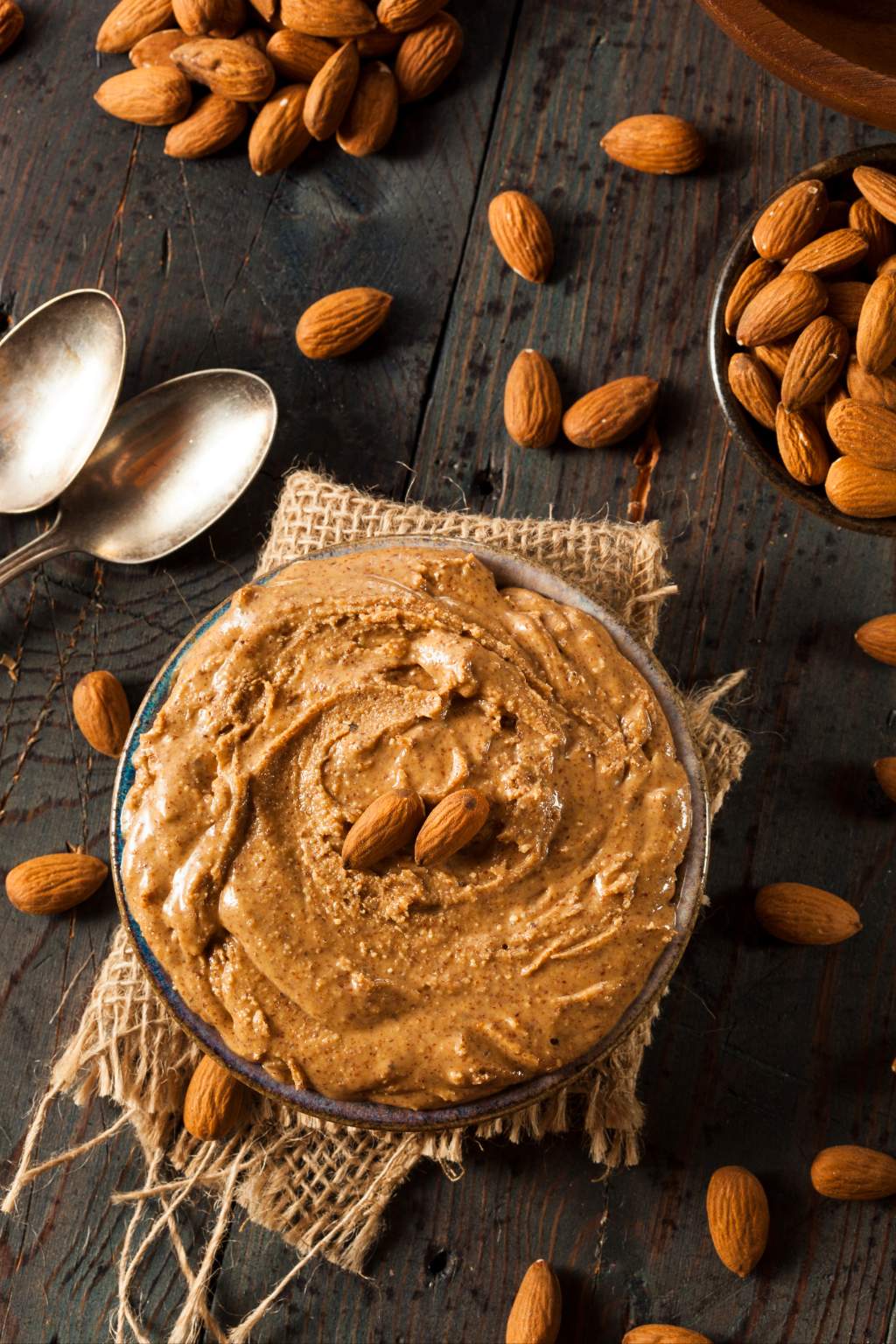Nutritional Differences Between Almond Butter and Peanut Butter
When choosing a nut butter, nutritional content often plays a significant role. Almond butter and peanut butter have distinct profiles, each offering unique health benefits. Below is a summary of their nutritional components, based on USDA FoodData Central information. These values may vary depending on the product’s specific brand and preparation method.
| Nutrient |
Almond Butter (per 100g) |
Peanut Butter (per 100g) |
| Calories |
645 kcal |
632 kcal |
| Protein |
20.8 g |
24 g |
| Total Fat |
53 g |
49.4 g |
| Saturated Fat |
4.25 g |
8.42 g |
| Monounsaturated Fat |
34.7 g |
30.7 g |
| Polyunsaturated Fat |
12.6 g |
9.78 g |
| Dietary Fiber |
9.7 g |
6.3 g |
| Calcium |
264 mg |
50 mg |
| Iron |
4.11 mg |
1.85 mg |
| Magnesium |
268 mg |
193 mg |
| Vitamin E |
16.7 mg |
5.41 mg |
| Potassium |
745 mg |
654 mg |
Almond butter is rich in fiber, magnesium, and Vitamin E, which can benefit bone health, cardiovascular health, and immune function. It also contains higher levels of monounsaturated fats, associated with heart health benefits. Peanut butter has a slightly higher protein content, which may be beneficial in certain applications. These nutritional differences allow manufacturers to target specific health claims or appeal to particular dietary needs.
Almond Butter vs. Peanut Butter in Flavor and Texture
Flavor and texture significantly impact product appeal and compatibility. Peanut butter typically has a deep, savory-sweet taste and a dense, creamy consistency, which works well in snacks where its bold flavor can stand out or complement other ingredients. This robust taste profile makes it a popular choice in energy bars and spreads, where peanut butter’s distinct flavor is often a highlight.
Almond butter, on the other hand, has a subtler, mildly sweet and nutty taste with a creamier, smoother texture that can be customized to fit various applications. This lighter flavor profile allows almond butter to integrate seamlessly with other ingredients without overwhelming them, making it ideal for dairy-free products, baked goods, or sauces that require a gentle nutty essence. Additionally, almond butter can be produced in varying consistencies, from ultra-smooth to coarser textures, giving brands flexibility in meeting texture preferences across different products. This adaptability is especially valuable for brands that emphasize clean-label or natural food formulations, where minimal ingredients and subtle flavor profiles are prioritized.
Almond Butter vs. Peanut Butter Applications Across the Food Industry
Peanut butter and almond butter each offer unique applications across the food industry, catering to different product needs and target markets. Peanut butter’s strong, familiar flavor and creamy texture make it ideal for mass-market items like spreads, sandwiches, and energy bars. Its distinct taste profile also works well in baked goods, adding a bold flavor in cookies, brownies, and confectionery fillings.
Almond butter, with its subtler taste and versatile texture, shines in specialty and plant-based products. It serves as an excellent base for dairy alternatives, such as yogurt and ice cream, delivering a creamy mouthfeel without overpowering other flavors. It’s also ideal for gluten-free or clean-label baking, where it contributes richness and moisture in muffins, pastries, and desserts. Both nut butters are popular in nutrition and protein bars, with peanut butter adding a stronger taste and almond butter offering a smoother, more neutral option for health-focused formulations.
| Application |
Peanut Butter |
Almond Butter |
| Dairy Alternatives |
Less suited for dairy-free applications due to strong flavor |
Excellent for non-dairy yogurt, cheese, and ice cream, with a mild, dairy-like texture |
| Non-Dairy Beverages |
Rarely used in beverages as flavor can overpower |
Blends smoothly in plant-based milk alternatives, adding a light, nutty taste |
| Baked Goods and Fillings |
Works well in cookies, brownies, and confections where bold flavor is desired |
Adds moisture and richness in gluten-free or clean-label baked goods, suited as a filling in pastries |
| Nutrition and Protein Bars |
Adds protein and a stronger nutty flavor popular in energy bars |
Offers a subtle taste and smooth texture, fitting health-conscious or flavor-neutral protein bars |
| Spreads and Snacks |
Common as a spread and in snack applications due to familiar, accessible taste |
Suited for health-focused snacks and as a spread in niche markets with specialty or clean-label flavors |
Both almond and peanut butter bring unique value to different product categories. Peanut butter remains a classic for flavor-forward applications, while almond butter’s mildness and versatility make it ideal for health-focused, plant-based formulations.
Allergen Considerations: Why Almond Butter May Be a Safer Choice
Managing allergens is critical for food manufacturers looking to provide safe, accessible products. While peanut allergies are among the most common and severe, almonds present a lower risk of severe allergic reactions, making almond butter an appealing alternative for allergy-conscious markets. According to research published in the Annals of Allergy, Asthma and Immunology, nearly 90% of individuals with peanut allergies could safely consume tree nuts, including almonds. However, about 40% choose to avoid them, primarily due to concerns about cross-contact during food processing—a factor that almond butter manufacturers can mitigate with strict allergen controls.
By choosing almond butter, brands can reduce allergen risks associated with peanuts and expand into allergy-friendly markets, such as school-safe and family-oriented product lines. For brands prioritizing allergen management, almond butter offers a versatile, lower-risk nut ingredient that retains the nutritional and flavor benefits of nut butters while supporting consumer safety and accessibility.
Cost and Supply Chain Factors to Consider for Peanut Butter and Almond Butter
Cost and supply chain considerations are essential when choosing between peanut and almond butter. While peanut butter has traditionally been more affordable due to widespread cultivation, its price can fluctuate based on crop conditions. Almond butter, though generally higher in cost, is becoming more accessible as the price gap between organic and conventional almonds narrows—opening new possibilities for brands focused on premium or organic options.
Sourcing almond butter from a trusted supplier like Harris Woolf Almonds offers added value in quality, sustainability, and scalability. Harris Woolf’s sustainable farming practices, including water-efficient irrigation and pollinator health initiatives, make our almonds an environmentally friendly choice. Our advanced processing and customization options ensure top-tier almond butter that meets the consistency and clean-label needs of premium products.
For businesses looking to scale, Harris Woolf’s reliable supply chain supports growth from small batches to full-scale production, maintaining product quality at every stage. This makes Harris Woolf Almonds a dependable partner for brands committed to excellence and sustainability.
Read more: Harris Woolf Almonds Impact Report 2023
Almond Butter vs. Peanut Butter: Which Should You Choose?
Deciding between almond butter and peanut butter comes down to your product’s goals and audience preferences. Peanut butter’s strong flavor, affordability, and higher protein content suit products where these qualities are highlights, such as mass-market snacks and protein bars. Almond butter, on the other hand, is ideal for brands aiming to deliver a nutrient-dense, versatile, and allergen-conscious ingredient with broad product applications. Its gentle flavor and texture customization options allow it to blend seamlessly into diverse formulations, from dairy-free products to premium snacks and baked goods.
Choosing the right nut butter is about aligning ingredient qualities with your product’s needs. For products emphasizing clean-label, allergen-friendly, and nutrient-dense formulations, almond butter presents a distinct advantage in the B2B landscape, enabling brands to meet diverse consumer demands and enhance product appeal.
Discover the Harris Woolf Difference for Exceptional Almond Butter
Harris Woolf Almonds provides a premium selection of almond-based ingredients, including almond butter and almond paste, tailored to meet the unique requirements of food manufacturers. Our almond butter, available in various roasts and textures, is crafted with precision to ensure quality and consistency, giving brands an edge in flavor, texture, and nutritional value.
Beyond our exceptional product quality, Harris Woolf Almonds offers tailored solutions for product customization, ingredient innovation, and reliable order fulfillment. Harris Woolf’s California-grown almonds are cultivated using sustainable practices, allowing brands to incorporate almond butter with confidence in both quality and environmental responsibility. Our expertise in sourcing, processing, and customization ensures that each product meets the highest standards for taste, texture, and nutrition.
For brands looking to innovate and enhance their product lines, Harris Woolf Almonds offers a partnership that combines quality, sustainability, and adaptability.
Learn more about our almond butter and how we can customize it to your specific product needs.














